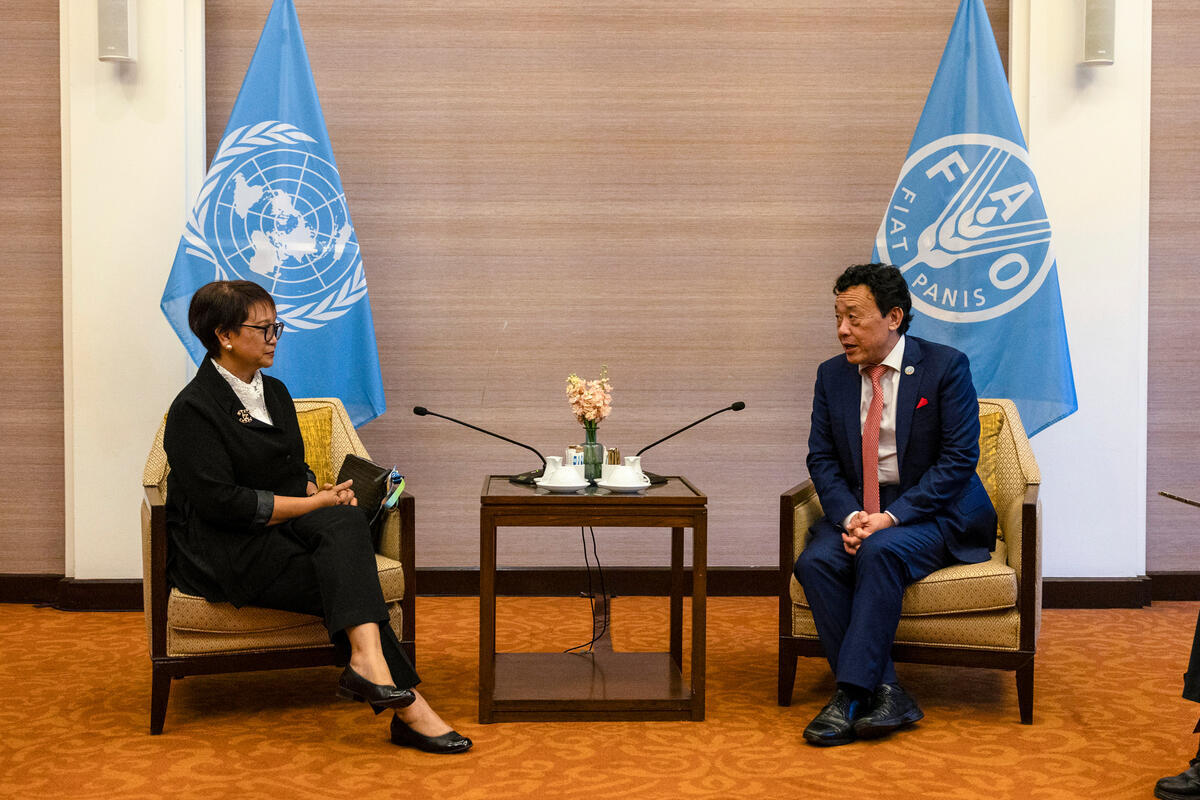Water is Life, Food is Water: Sustaining Water and Ensuring Food for the Future
Joint OpEd by Mrs. Retno Marsudi, UN Secretary General’s Special Envoy on Water, and Dr QU Dongyu, FAO Director-General
09/07/2025

The FAO Director-General QU Dongyu met with Retno L.P. Marsudi, UN Special Envoy on Water, on the margins of the International Soil and Water Forum 2024
©FAO/Luke Duggleby
When was the last time we truly considered how the food on our plate is produced or how it affects the future of our planet and of our own lives?
Water is essential to agriculture – indispensable for food production – accounting for 72 percent of global freshwater withdrawals. Producing enough food for one person each day requires between 2 000 to 5 000 liters of water in a year. Yet today, one in every eleven people suffers from hunger, and over 2.8 billion people cannot afford a healthy diet.
By 2050, global food production must increase by 50 percent compared to 2012 levels to avoid worsening hunger and malnutrition. This will demand up to 30 percent more freshwater, presenting a profound challenge in a world in which 40 percent of the global population is already facing water scarcity.
By 2050, three-quarters of the world’s population is expected to live in areas experiencing drought, as global warming accelerates beyond our capacity to adapt. Business as usual is simply no longer to be sustained.
We must act decisively. Food production depends on water – critical for sustaining our lives, our future and the planet. We need a balanced approach that ensures the sustainability of both.
Water is life, and food is water. More than 95 percent of our food is produced using freshwater, it is therefore imperative that we view food production through the lens of water availability and sustainability.
The way we currently produce food and use water is leading us to a deteriorating future — on a worsening planet. We must urgently accelerate the transformation of our agrifood systems to be more efficient, more inclusive, more resilient and more sustainable.
First, we must produce more with less – more food, fiber and feed with less water. This means implementing integrated water resource management approaches and innovative solutions. Transformative change requires putting water-responsive approach at the heart of agrifood systems, such as wastewater reuse for agriculture, drought-resilient crops, smart and enhanced irrigation systems, as well as emerging water-saving methods and technologies. Success requires strong political will, cross-sectoral coordination and policy coherence at all levels.
Second, we need robust information and data to guide informed decisions on how much water is available, how it is used and where it is needed most – for the agrifood sector and beyond. In a world with increasing competition for water, agriculture is more vulnerable and disadvantaged in the water allocation decision process. Water accounting and assessment, equitable allocation and planning, and national water strategies and roadmaps are essential to ensure sustainable water allocation across sectors and at sub-national level.
Third, international cooperation in innovation and technology must drive change. Advanced technologies – artificial intelligence (AI), big data, and the Internet of Things (IoT) – offer unprecedented potential. For instance, AI can tailor water use based on crop needs and environmental conditions, greatly improving efficiencies and effectiveness in water use – producing more with less. However, this potential can only be fully realized through global partnerships, capacity building, knowledge and technology sharing, and concrete investment.
Fourth, we must place farmers, especially women and youth, at the center of agrifood systems transformation. In many parts of the world, women and girls bear the brunt of water scarcity. In agriculture, the same holds true. In many sub-Saharan African and Southeast Asian countries, half of the labour force in agriculture is female. Empowering women and youth in agriculture and water management is about equity and effectiveness, which are essential to driving agrifood systems transformation.
Finally, we need the highest level of political commitment to shift the prevailing mindset to recognize water management as a long-term investment in sustainable and resilient food production and food security. Strong political will at the global level can ensure that water becomes and remains a priority.
Since 2022, FAO has intensified advocacy for water and global food security. The 43rd FAO Ministerial Conference in 2023 (FAO’s highest Governing Body, comprising its 194 Members), endorsed integrated water resource management as a priority for the 2024-2025 biennium, highlighting the critical link between water and food.
There is no one-size-fits-all solution. Success will depend on combining innovative approaches, local knowledge and expertise, modern technologies and innovations, investments and coherent policies.
The Triple A principles – Advocacy, Alignment, and Acceleration – provide a framework within global agrifood systems to advance water sustainability and water productivity.
Water is key to ensuring the Four Betters: better production, better nutrition, a better environment and a better life for all – leaving no one behind.
Transforming global agrifood systems through better water management is not optional – it is a survival imperative, vital to ensuring food security and a livable future on our blue planet.
A future without water is a future without life on Earth.
